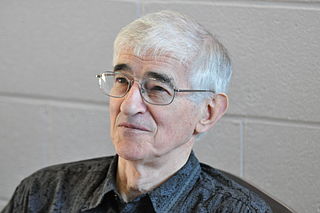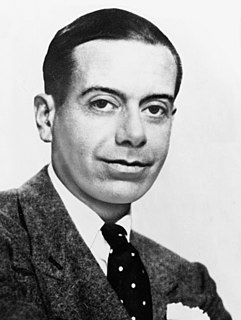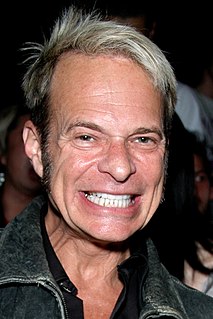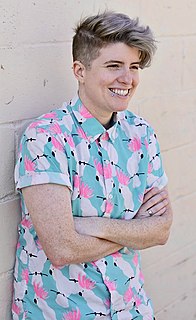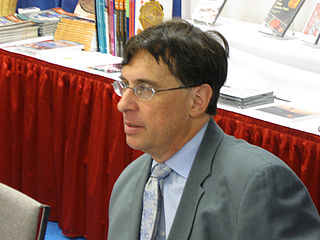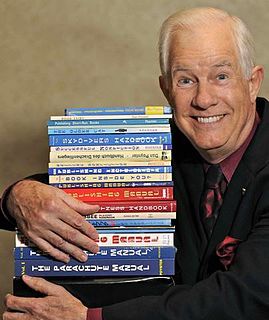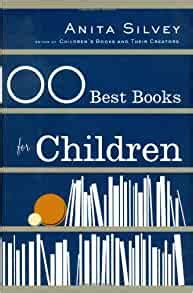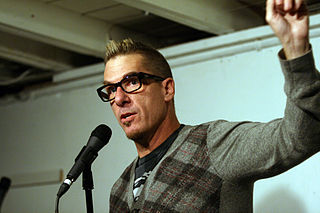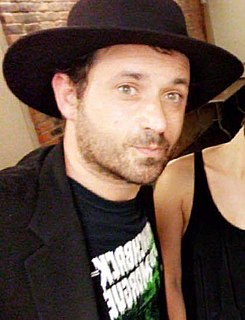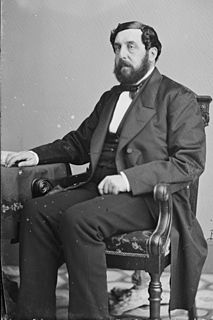Top 1186 Authors Quotes & Sayings - Page 17
Explore popular Authors quotes.
Last updated on April 22, 2025.
Jesus' death by crucifixion under Pontius Pilate is as sure as anything historical can ever be. For if no follower of Jesus had written anything for one hundred years after his crucifixition, we would still know about him from two authors not among his supporters. Their names are Flavius Josephus and Cornelius Tacitus.
A book is an attempt to make through permanent and to contribute to the great conversation conducted by authors of the past. […] The telegraph is suited only to the flashing of messages, each to be quickly replaced by a more up-to-date message. Facts push other facts into and then out of consciousness at speeds that neither permit nor require evaluation. (70)
My sole inspiration is a telephone call from a director. ... (when asked who wrote 'Some Enchanted Evening') Rodgers and Hammerstein, if you can imagine it taking two men to write one song. ... Good authors, too, who once knew better words now use only four-letter words writing prose. ... Brush up your Shakespeare and they'll all kowtow.
I would say that most of my books are contemporary realistic fiction... a couple, maybe three, fall into the 'historic fiction' category. Science fiction is not a favorite genre of mine, though I have greatly enjoyed some of the work of Ursula LeGuin. I haven't read much science fiction so I don't know other sci-fi authors.
It's great that there are so many different kinds of books for kids and adults to choose from. I think an eclectic reader is the best kind of reader to be, which would be why I was always so satisfied to hear that kids read the Baby-Sitters Club books and then went on and discovered other authors and other genres.
As far as my experience goes, men of genius are fairly gifted with the social qualities; and in this age, there appears to be a fellow-feeling among them, which had not heretofore been developed. As men, they ask nothing better than to be on equal terms with their fellow-men; and as authors, they have thrown aside their proverbial jealousy, and acknowledge a generous brotherhood.
When I started writing, the deal was that publishers gave you a grand or two as an advance to buy some sweets, with the promise that they would make a big putsch with your fourth book when you'd built up a bit of a following. But by the time my fourth book came out, previously unpublished authors were the new big thing.
If it were a rainy day, a drunken vigil, a fit of the spleen, a course of physic, sleepy Sunday, an ill run at dice, a long tailor's bill, a beggar's purse, a factious head, a hot sun, costive diet, want of books, and a just contempt for learning - but for these. . .the number of authors and of writing would dwindle away to a degree most woeful to behold.
I think a diversity of expression can only be good, so I think the more that people write about their experience, use their imagination to deal with their experience, you know, I think that's going to be good for not only for those authors but also for people who are interested in trying to understand it.
On the whole, books are indeed less finite than ourselves. Even the worst among them outlast their authors - mainly because they occupy a smaller amount of physical space than those who penned them. Often they sit on the shelves absorbing dust long after the writer himself has turned into a handful of dust.
Books have always been living things to me. Some of my encounters with new authors have changed my life a little. When I have been perplexed, looking for something I could not define to myself, a certain book has turned up, approached me as a friend would. And between it's cover carried the questions and the answers I was looking for.
Can a one judge sitting somewhere in a trial court issue an order that says nobody in the world is allowed to have, to use, to improve or to develop software for playing multimedia content without the permission of the manufacturers of the content themselves? .. This is an astonishing development in the course of our understanding of what we call the copyright bargain, the relationship between authors' rights, publishers' leverages and consumers' needs.
To refer even in passing to unpublished or struggling authors and their problems is to put oneself at some risk, so I will say here and now that any unsolicited manuscripts or typescripts sent to me will be destroyed unread. You must make your way yourself. Why you should be so set on the nearly always disappointing profession is a puzzling question.
Truth is not only stranger than fiction, it is more telling. To know that a thing actually happened gives it a poignancy, touches a chord, which a piece of acknowledged fiction misses. It is to touch this chord that some authors have done everything they could to give you the impression that they are telling the plain truth.
The world and all its wisdom is but a booby, blundering school-boy that needs management and could be managed, if men and women would be human beings instead of just business men, or plumbers, or army officers, or commuters, or educators, or authors, or clubwomen, or traveling salesmen, or Socialists, or Republicans, or Salvation Army leaders, or wearers of cloths.
This book reminds me of James Gleick's Chaos. The ideas and stories in Loving and Hating Mathematics are timely, interesting, and sometimes even profound. The authors, writing for nonspecialists, take pains to explain technical ideas in nontechnical language, and the book should interest general readers as well as a large mathematical audience.
There are only so many letters in the alphabet. When I talk to young musicians or authors and they ask for advice, I say, 'You gotta learn all the letters of your own personal alphabet. With music, you need to know all the different kinds of music and everything in and around your given instrument.'
I've often said that there's no one thing that I do or have done that is particularly unique. There have been a lot of other authors who were in the military. There have been a few others who were pilots. There have certainly been a lot of other people who were in politics or served congressional staffs.
Authors have a greater right than any copyright, though it is generally unacknowledged or disregarded. They have a right to the reader's civility. There are favorable hours for reading a book, as for writing it, and to these the author has a claim. Yet many people think that when they buy a book they buy with it the right to abuse the author.
Such do not always understand the authors whose names adorn their barren pages, and which are taken, too, from the third or the thirtieth hand. Those who trust to such false quoters will often learn how contrary this transmission is to the sense and application of the original. Every transplantation has altered the fruit of the tree; every new channel, the quality of the stream in its remove from the spring-head.
No man's thoughts are new, but the style of their expression is the never-failing novelty which cheers and refreshes men. If we were to answer the question, whether the mass of men, as we know them, talk as the standard authors and reviewers write, or rather as this man writes, we should say that he alone begins to write their language at all.
Its authors meant it to be... a stumbling block to those who in after times might seek to turn a free people back into the hateful paths of despotism. They knew the proneness of prosperity to breed tyrants, and they meant when such should re-appear in this fair land and commence their vocation they should find left for them at least one hard nut to crack.
The Unheavenly Chorus is the definitive study of participatory inequality in America. Marshaling prodigious evidence, the authors show how money not only buys influence directly but also affects associations that are supposed to be democratic antidotes to concentrated wealth. A monumental achievement of careful scholarship, this book offers real knowledge of how politics actually operates.
I have favorite authors from a lifetime of reading, so there are some I'll automatically read every time they have a new novel. Included in them: Robert Goddard, Jeffery Deaver, Sophie Kinsella, Katherine Neville, Greg Isle, Laurie King, Lee Child, Lisa Tucker, Susan Howatch, Paul Auster. Barry Eisler, David Hewson, Tracy Chevalier.
I myself discovered many authors through school reading lists and through school anthologies. The positives are: young readers can find the world opening up to them through books they study. The negatives may include bad experiences kids have - if they don't like the book or the teacher, or the way the book is taught.
The great British Library --an immense collection of volumes of all ages and languages, many of which are now forgotten, and most of which are seldom read: one of these sequestered pools of obsolete literature to which modern authors repair, and draw buckets full of classic lore, or pure English, undefiled wherewith to swell their own scanty rills of thought.
Under true peer-review...a panel of reviewers must accept a study before it can be published in a scientific journal. If the reviewers have objections the author must answer them or change the article to take reviewers' objections into account. Under the IPCC review process, the authors are at liberty to ignore criticisms.
There is little disagreement on our planet that the lives of most human beings could be improved immensely. Words pour out of lecturers, articles pour out of magazines, and books pour out of authors, all seeking to help us understand how we can have more peace, security, health, opportunity, happiness, fulfillment, abundance, and love.
Some of my colleagues are surprised by how little personal interaction I've had with "my" authors, but I don't translate to go fishing for friends. Part of me suspects that they wouldn't like me, or that I wouldn't like them, which would inevitably get in the way of the mission. None of the theory built around translation matters to me anyway: much of the process, I find, is intuitive.
I think the judging process is full of integrity, compared to some other prizes around the world. The fact that they change the panel of judges every year keeps it from becoming corrupt. I think it's very difficult if you've got judges for life; obviously relationships are cultivated between judges and authors, and publishing houses.
In societies that worship money and success, the losers become objects of scorn. Those who work the hardest for the least are called lazy. Those forced to live in substandard housing are thought to be the authors of substandard lives. Those who do not finish high school or cannot afford to go to college are considered deficient or inept.
Thousands of volumes have been written about aviation, but we do not automatically have thousands of true and special friends in their authors. That rare writer who comes alive on a page does it by giving of himself, by writing of meanings, and not just of fact or of things that have happened to him. The writers of flight who have done this are usually found together in a special section on private bookshelves.
And for the citation of so many authors, 'tis the easiest thing in nature. Find out one of these books with an alphabetical index, and without any farther ceremony, remove it verbatim into your own... there are fools enough to be thus drawn into an opinion of the work; at least, such a flourishing train of attendants will give your book a fashionable air, and recommend it for sale.
I've noticed that most authors who are pastors or speakers write books whose message is derived from a sermon series they did at their church. I guess my process is similar except that instead of a sermon, the genesis of the idea is found in the form of a three-minute song. And many of my songs have been inspired by the true stories and testimonies of people who've written to me from all over the world.
For almost a quarter of a century, Teen Ink has been encouraging young people to write - and then has published those pieces. These heartfelt essays and poems explore the issues faced by teenagers today. I applaud their efforts because they not only help young people deal with their own lives but also encourage the budding authors of the next generation.
Thus, then, stands the case. It is good, that authors should be remunerated; and the least exceptionable way of remunerating them is by a monopoly. Yet monopoly is an evil. For the sake of the good we must submit to the evil; but the evil ought not to last a day longer than is necessary for the purpose of securing the good.
I read reviews and consider myself pretty 'plugged in' to the literary cosmos, yet one of the things I love best about book-touring is the opportunity to compare notes with favorite booksellers around the country. I always come home with books by authors I'd never heard of - or books I've read about but didn't realize I might love.
Most authors writing books like 'He's Just Not That Into You' dream of doing what I was being asked to do. I didn't like it. I'm good at giving advice, but doing it on TV and radio felt wrong, and when people resisted my point of view, I was like, 'Why am I doing this? This was not the plan.' So I stopped. It didn't make me feel good.
Professors will lecture with more inspiration if they occasionally alternate the classroom with the beach: authors will write better when, as Macaulay used to do, they write for two hours, then pitch quoits, and then go back to their writing. But certainly more than the mere mechanical alternation is involved.
I'm getting very sorry for the Devil and his disciples such as the good Le Chiffre. The devil has a rotten time and I always like to be on the side of the underdog. We don't give the poor chap a chance...the Devil had no prophets to write his Ten Commandments and no team of authors to write his biography.
I think some horror authors are trying to scare you, but with me, I'm as scared as the reader is of the story. I've always been that way, since watching the 'Twilight Zone' movie - watching 'Firestarter' when my parents were out, or sneaking out to watch 'A Nightmare on Elm Street' at a friend's house because I couldn't watch it at my house.
The four most dangerous words in finance are 'this time is different.' Thanks to this masterpiece by Carmen Reinhart at the University of Maryland and Kenneth Rogoff of Harvard, no one can doubt this again. . . . The authors have put an immense amount of work into collecting the data financial institutions needed if they were to have any chance of making quantitative risk management work.
Authors of so-called 'literary' fiction insist that action, like plot, is vulgar and unworthy of a true artist. Don't pay any attention to misguided advice of that sort. If you do, you will very likely starve trying to live on your writing income. Besides, the only writers who survive the ages are those who understand the need for action in a novel.
Whenever I would see horror movies I would be traumatized and I'd have to watch them behind my hands or behind the couch sometimes. So I grew up first with authors like John Bellairs and R.L. Stine for kind of the young adult horror. But I found Stephen King in the sixth grade and that was it. I became a rabid fan.
Professed authors who overestimate their vocation are too full of themselves to be agreeable companions. The demands of their egotism are inveterate. They seem to be incapable of that abandon which is the requisite condition of social pleasure; and bent upon winning a tribute of admiration, or some hint which they can turn to the account of pen-craft, there is seldom in their company any of the delightful unconsciousness which harmonizes a circle.

